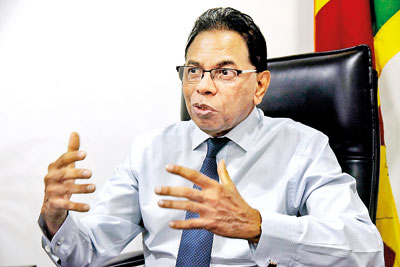News
New bureaus to be introduced to strengthen primary healthcare sector, says Health Secretary
View(s):By Tharushi Weerasinghe
The Health Ministry is introducing six new bureaus and rolling out reforms within the primary healthcare sector to face any health challenges.
“We are going to transform disease surveillance, and primary healthcare services, introduce accreditations to ensure patient safety, and work closely with professional bodies to train healthcare stakeholders by expanding existing structures with new investments and collaborations,” the Ministry secretary, Dr. P.G. Mahipala, told the Sunday Times on Friday.
One of the new introductions is the Patient Safety and Accreditation Bureau. The Quality Assurance Secretariat will be transformed and expanded to facilitate new accreditation processes alongside other medical professional bodies. The Ministry is holding talks with the Australian Accreditation Council (AAC), which will train local assessors for the new bureau. A formal visit by AAC officials has also been organised.

Health Ministry secretary Dr. P.G. Mahipala. Pic by Akila Jayawardena
Another bureau will focus on maternal health to achieve single-digit mortality rates. Current maternal mortality reviews will be supplemented with “near-miss inquiries” to study complicated cases. Additionally, “confidential inquiries into deaths,” conducted in a double-blind manner, will focus on patient management rather than individual culpability. This committee will report directly to the Secretary and the Director General of Health Services.
The epidemiology unit will be transformed into a Centre for Disease Control (CDC). “We have submitted this proposal to the pandemic fund, and we’ll probably get support,” noted Dr. Mahipala. A new structure will facilitate integrated disease surveillance, covering communicable and non-communicable diseases. Preparation for disasters and pandemics will also be managed by this bureau. Discussions are underway with the Bay of Bengal Initiative for Multi-Sectoral Technical and Economic Cooperation (BIMSTEC) to establish Sri Lanka’s new unit as the regional Centre for Disease Control. “We will be meeting with country ministers as the host network for this by the end of August,” the ministry secretary said. The CDC will also initiate an electronic immunisation registry to maintain online immunisation records.
A health information bureau, an expansion of the current directorate, will also be introduced to maintain electronic patient records. This is being funded by the Global Fund.
Additionally, a family health bureau will be established, and a health planning bureau will be expanded to include professional training and capacity building for health sector workers. This bureau will develop comprehensive health packages for various professional levels and will oversee staff training, counselling, and the introduction of self-assessment software for mental health.
Rs. 45 billion investment has been approved by the World Bank for this primary health sector reform mechanism spanning five years. “We received these funds following negotiations with the World Bank and have already received approval from the Cabinet, the Treasury, and the World Bank, so these reforms will begin in August,” Dr. Mahipala said.
The reforms also include infrastructural improvements, like the introduction of summer huts for elderly OPD patients. 1060 primary health centres have been identified for this project, which aims to reduce the strain on the secondary healthcare system by ensuring an equal standard of care. A study will also be conducted on the number of people visiting hospitals to decide on resource allocations. Digitalized appointment systems operated by primary healthcare workers will be introduced to reduce wait times and crowding at specialist clinics.
Dr. Mahipala noted that while Sri Lanka currently has the best health indicators in the region and has controlled communicable diseases like malaria and polio, new challenges are emerging. Non-communicable diseases, fuelled by unhealthy lifestyle changes, are on the rise. Thanks to longer lifespans, Sri Lanka’s elderly population is increasing, leading to higher numbers of chronic diseases like heart disease, cancer, and diabetes.
“At present, we treat diseases when they arise, but we need to screen people with hypertension and diabetes early to start treatment and recommend lifestyle changes to avoid complications,” said Dr. Mahipala. The goal of the new reforms is for primary healthcare centres to function as community centres engaging in preventative healthcare.
Initial reforms will be managed with the current workforce, while staff capacity building will be looked into. He said currently, 1300 doctors have received peripheral appointments, and 450 more are completing their training. In January, 2200 nurses entered the system, and 1000 midwives have also been absorbed for training.
Dr. Mahipala noted that these reforms resulted from an in-ministry think tank consisting of 25 experts from the health sector and related fields, meeting biweekly to deliberate on specific matters. The recommendations were then put before a public health colloquium of 72 experts before being proposed.
The best way to say that you found the home of your dreams is by finding it on Hitad.lk. We have listings for apartments for sale or rent in Sri Lanka, no matter what locale you're looking for! Whether you live in Colombo, Galle, Kandy, Matara, Jaffna and more - we've got them all!

